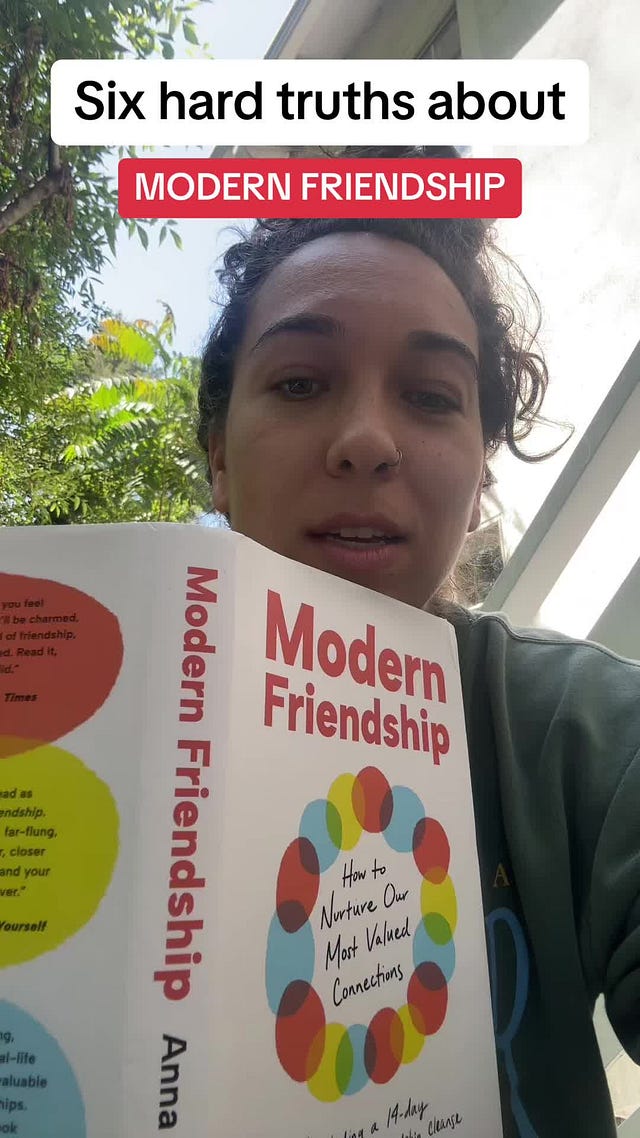Friendship Explained: The Vexing Problem of the Medium Friend, per the NYT
How do we solve a problem like "medium friends"?
Hello hello!
My book, Modern Friendship, has been out in the world for three weeks and it’s been wonderful.
The reviews on Amazon and Goodreads have been glowing. And, my book was just named a June 2024 Must-Read by the Next Big Idea Book Club.
Not too shabby for a semi-lazy cat mom who shops at Old Navy!
If you’ve already read the book, please leave a review wherever you purchased it. It helps so, so much.
Alert: I’m doing a thing
I’m delighted to share that I will be in conversation with the wonderful
at Guild Hall in East Hampton this Sunday, June 30th at 1pm. We’re going to dive into all things friendship.I was lucky enough to chat with Katie recently on her podcast, the WANTcast. It will be a rollicking good time. Please come if you’re around. There will be a Q&A and book signing after too.
I just checked my watch and it’s HOT TAKE O’CLOCK
The New York Times published a story this week bemoaning the limitations and confusion “medium friends” present. Lisa Miller writes:
Medium friends are genuine friends. You share history (such as the same alma mater), circumstances (an employer) or interests (rude jokes, the royals, thrifting or squash). Medium friends make you laugh, bring news, offer insights or expertise. But, unlike the closest friends, medium friends test the limits of your time, love and energy. There are only so many dinners in a week, so many people with whom you can be incessantly texting. Medium friends prove the lie in any naïve attempt to be all things to all people.
And, she adds:
And that is the problem with medium friends, the invisible lines you draw around them without ever being explicit — to them or even, possibly, to yourself. Reciprocity is the foundation of every friendship: mutual sharing and caring in a context of trust. The tension embedded in medium friendship is this absence of clarity, allowing for the possibility of what Claude Fischer, a sociologist at the University of California, Berkeley, referred to in an interview as “asymmetric expectation”: You may like your medium friend less (or more) than they like you. With a lover, partner or a very close friend, you may negotiate imbalances, hash out wounds or betrayals. But somehow such conversations feel impossible in the medium realm.
What’s going on here: The issue with medium friends isn’t a lack of clarity, as Ms. Miller says. The issue is a lack of desire in the friendship from one or both people.
How desire in a friendship works: Every active friendship needs a clear and compelling about to keep the friendship in an active status.
In these medium friendships, as Ms. Miller calls them, the about of the friendship is either outdated or absent. That’s why the friendship has drifted.
Miller is claiming these medium friends –– the ones where no clear and compelling about is present –– are the cause of a lot of hand-wringing, anxiety and tension.
This does NOT have to be the case.
Let’s take the neuroticism out of friendship. Normalize the fact that friendships cool for common, expected –– nay! –– inevitable reasons. Nothing’s wrong here! Nothing needs to be solved!
By the way, we can always re-negotiate a friendship at any time, if you want to. It’s not weird and it’s not hard.
This could look like saying something like, “Hey! I’d love to spend more time together! What are your goals and dreams and how can I help you achieve them?” Or, “Hey! I’m looking for a workout buddy. Any interest in joining me?” Or, “I love that you’re into art. Want hit up the new exhibit at our local museum?”
If the invitation is clear and compelling (that’s key!), your friend will be more likely to say yes.
Final thoughts on “Medium friends”: It’s on us to recognize why a friendship is or is not active. It’s on us to treat our friendships at the level they’re at TODAY. Not three years ago. Not thirty years ago. Today. Have flexible, realistic expectations for your friends.
So how do you regard a medium friend who reaches out to you and makes a request: You evaluate the request and make a reasonable effort to engage, if you want. Resist people-pleasing because agreeing to do things you don’t want to do is a form of lying. Don’t over-promise anything. Don’t over-extend yourself. Be authentic with your needs, wants and availability.
There’s no need to stress about relationships you’ve outgrown, I promise! We’re allowed to evolve. We’re allowed to pull away from some friendships and embrace others. “That’s life!” - David Lee Roth, and me.
The wonderful Miriam Tinberg <https://www.tiktok.com/@miriam_tinny> has been breaking down concepts from my book over on Tiktok!
One more:
Thank you, Miriam!!! You rock!!
This week, you can find me:
On the Health Gig podcast with Doro Bush Koch
Things I’ve been loving:
Ren Faire on HBO was captivating and only three episodes.
The new Khruangbin album is terrific. It’s so ephemeral it feels like listening to a piece of lace flapping in the breeze
The Jonestown docuseries on Hulu was very disturbing but I couldn’t look away. Cults are a real humdinger.
Your buddy,
Anna











Anna-- you're so right about the "about" issues in the "medium" friendships and your book tackles this so well. And I could not agree more that this really isn't a problem unless one party really wants more out of the friendship. And IF that's the case, then that person needs to make a move of some kind. I love your suggestions here.
Helpful clear descriptions: Reciprocity is the foundation of every friendship: mutual sharing and caring in a context of trust. The tension embedded in medium friendship is this absence of clarity.
With a lover, partner or a very close friend, you may negotiate imbalances, hash out wounds or betrayals. But somehow such conversations feel impossible in the medium realm.
Thank you, Anna.